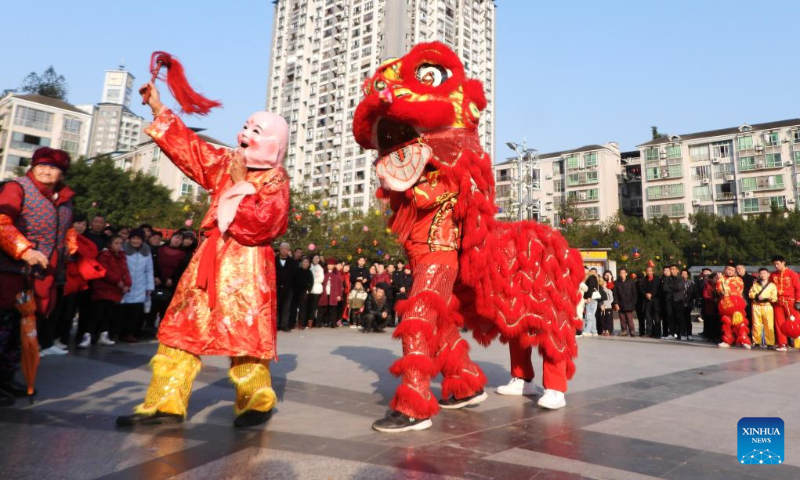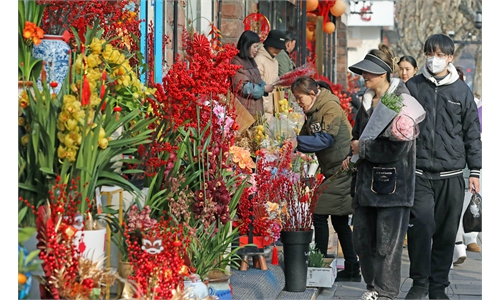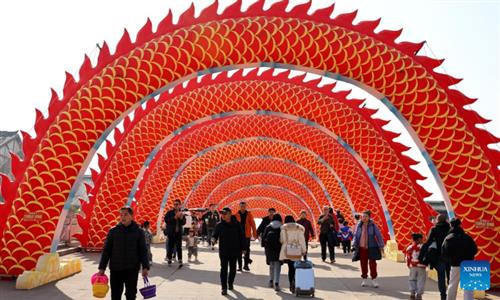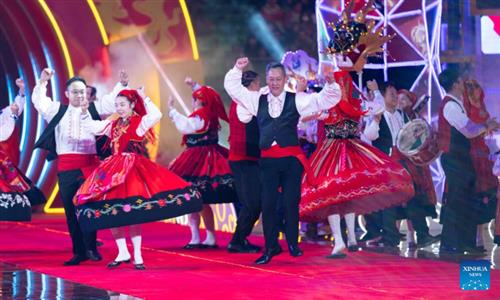ARTS / CULTURE & LEISURE
What's trending this Chinese New Year

Folk artists perform lion dance in Dazhou, southwest China's Sichuan Province, Feb. 11, 2024. Chinese people celebrate the Spring Festival through various ways during their holiday. (Photo by Deng Liangkui/Xinhua)
The vitality and innovation of the Chinese culture has led people across China to develop new ways to celebrate the Spring Festival such as visiting temple fairs outside one’s own hometown, "village gala" performances, museums and revolution-themed venues.
As of Wednesday, tickets for many museums such as the Palace Museum in Beijing, the Chengdu Museum in Southwest China’s Sichuan Province, the Luoyang Museum in Central China’s Henan Province, and the Emperor Qinshihuang's Mausoleum Site Museum in Northwest China’s Shaanxi Province have all been fully sold out.
Due to the overwhelming number of visitors, the Sanxingdui Museum in Sichuan announced on Saturday that they temporarily extended their opening hours to 8 pm and extended the online reservation slots from February 11 to 17. Currently, tickets for all available time slots have already been booked.
Liu Meng, a resident from Fangshan district in Beijing, told the Global Times on Tuesday that he took his daughter to the Zhoukoudian Site Museum in Fangshan which offered free admission to visitors during the Spring Festival holidays and which has set up new shows for the benefit of the public.
In addition to the exhibition of the renowned “Peking Man,” a Chinese dragon-themed show has been staged by the museum to showcase various styles and expressions of dragons dating back to the Song Dynasty (960-1127), helping people gain a better understanding of the rich and unique cultural artifacts related to dragons across different regions and traditions in China and promoting appreciation for the diversity of Chinese culture.
“More people have opted for marking the holidays in museums and the we were lucky to be able to make a reservation yesterday. We also watched some intangible cultural heritage show on the spot like shadow puppetry,” Liu said.
In Harbin, Northeast China’s Heilongjiang Province, the Museum of Evidence of War Crimes by the Japanese Army Unit 731, which remains open during the Spring Festival holidays, saw throngs of visitors every day.
"The Chinese New Year is a wonderful time for family reunions, but the sweet and cozy atmosphere of reunion requires us to also remember the bitter moments of our history. Bringing children here is about getting them closer to history and not forgetting it," said Wu Jiakuan, a tourist from South China’s Guangdong Province.
Meanwhile, the memorial of the first National Congress of the Communist Party of China in East China’s Shanghai has greeted the visitors with revolutionary-themed exhibitions and activities that integrates intangible cultural heritage with revolutionary history.
As part of the efforts to celebrate the traditional Chinese festival and promote its endeavor to inscribe the Spring Festival as a UNESCO Intangible Cultural Heritage of Humanity, China’s Ministry of Culture and Tourism (MCT) has joined hands with several provinces to launch a string of "village Spring Festival gala" in rural areas, Zhang Xuxia, spokesperson of the ministry, told the Global Times in January.
The total of 91 village galas held between January and February across the country attracted over 1 million viewers online and offline, showcasing the local rural landscape, folk customs, and cultural heritage, according to MCT.
When old traditions of worshiping ancestors meet the new celebrations of cultural performances, the self-directed village gala has emerged as a novel custom of rural festivities.
With all performers coming from surrounding villages and playing their handmade musical instruments, the Bozhuang village gala held in January in North China’s Shanxi Province generated nearly 8 million views on Douyin, the Chinese language version of TikTok, the Xinhua News Agency reported.
According to MCT, more than 20,000 model village galas were held around China in 2023, amounting to about 130 million instances of participation.
Wu Shuide, manager of the Sama band which is dedicated to inheriting and developing the music of the Miao and Dong ethnic groups in Southwest China’s Guizhou Province, stated that stages like village gala showcase the abilities and confidence of the new generation of cultural inheritors from across the country.




